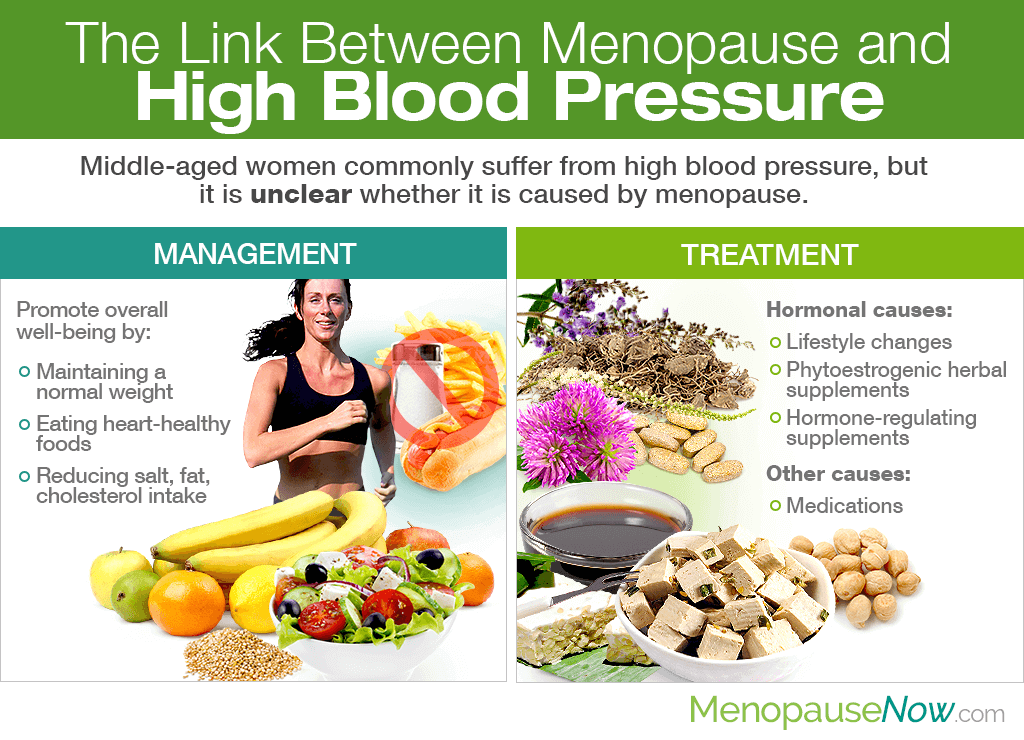According to the Center for Disease Control and Prevention, nearly 80 percent of women past menopause have high blood pressure, leading researchers and doctors in efforts to find the connection between blood pressure and the menopausal transition.
Continue reading to learn about the link between menopause and high blood pressure as well as effective management and treatment techniques for optimal cardiovascular health.
Does Menopause Cause High Blood Pressure?
It is being observed that middle-aged women are suffering from high blood pressure, but it is unclear whether it is directly caused by menopause. The following are possible explanations behind menopause high blood pressure.
First, a drop in estrogen may negatively affect the health of arteries as one of the hormone's principal roles is in maintaining their flexibility and promoting normal blood flow.
Next, drastic hormonal fluctuations make blood pressure more sensitive to salt in the diet, which means consuming even normal amounts of the nutrient in one's diet can provoke unhealthy spikes in blood pressure.
Aside from these, there are other reasons why middle-aged women may suffer from high blood pressure during perimenopause or after menopause, including weight gain, aging, diabetes, insulin resistance, and more.
No matter the cause, high blood pressure, called hypertension, can also cause a variety of symptoms that are often credited to menopause, such as hot flashes, anxiety, fatigue, headaches, irregular heartbeat, and sleep disorders, among others.
Either way, in order to avoid the long-term complications of hypertension, which include heart and kidney failure, vision problems, dementia, and more, it is crucial that women manage and treat their condition.
Management of High Blood Pressure during Menopause

Some of the most important management techniques for menopause high blood pressure are those that will also promote overall health and well-being. They include:
Maintaining a healthy weight, especially since high body mass index (BMI) is a risk factor of hypertension
Eating heart-healthy foods consisting of whole grains as well as fresh fruits and vegetables
Exercising regularly, even if it is just a 30-minute walk, five days a week
Quitting smoking since it is a cardiovascular risk factor and doing so will prevent other associated diseases
Managing stress with relaxation techniques of meditation, deep breathing, yoga, or tai chi
Limiting or avoiding alcohol as heavy drinking can damage the cardiovascular system and cause high blood pressure
Reducing salt, fat, and cholesterol intake by consuming fresh, wholesome foods instead of processed
Women who need help in quitting smoking or drinking should seek professional assistance immediately.
Moreover, although these aforementioned measures will help control high blood pressure after menopause and even during the transition, the best way to handle the condition is to treat the underlying cause.
Treatment of High Blood Pressure during Menopause

For many midlife women, treating the underlying cause of high blood pressure during menopause means addressing the hormonal imbalance at fault.
Pre- and postmenopausal women should pursue menopause symptoms treatments that highlight many of the lifestyle adjustments mentioned in the management section, all of which will foster endocrine system health. They should also enrich their diets with phytoestrogens, plant-based estrogens that fill in the hormonal gap.
For improved results, women suffering from the symptoms of menopause and high blood pressure are urged to use alternative medicine. The two acclaimed to promote hormonal balance the most include phytoestrogenic herbal supplements and hormone-regulating supplements.
Phytoestrogenic herbal supplements
Phytoestrogenic herbal supplements contain higher concentrations of phytoestrogens than foods alone, thus introducing exogenous estrogens into the body in greater amounts for symptom relief.
Some of the most popular are black cohosh, red clover, dong quai, and chaste tree berry.
Nonetheless, because they introduce outside hormones into the body, they are more appropriate for short-term use and should be consumed with caution to avoid dependency. Work with a certified herbalist for appropriate dosing.
Hormone-regulating supplements
On the other hand, hormone-regulating supplements - like Macafem - nourish the endocrine glands to encourage endogenous hormone production, thus relieving menopause symptoms, high blood pressure being one of them.
Because they do not contain exogenous hormones, they are safer for long-term use throughout the menopausal transition, from perimenopause into postmenopause.
If hypertension is severe or due to other causes, your doctor may encourage the use of pharmaceutical treatment options.
Key Takeaways
In conclusion, there appears to be a link between menopause and high blood pressure, yet the exact cause can be attributed to many factors, drastic hormonal fluctuations being just one. Luckily, there are many management techniques available, focusing on maintaining a healthy weight, eating a heart-healthy diet, getting enough exercise, and practicing wholesome habits. Yet, treatment will prove most beneficial, which revolves around addressing the underlying hormonal imbalance. Through lifestyle changes alongside the use of alternative medicine, women can naturally and effectively take their cardiovascular health into their own hands for optimal health and well-being.
Sources
- Alcohol.org. (2018). High Blood Pressure from Alcohol Consumption. Retrieved May 21, 2019, from https://www.alcohol.org/effects/blood-pressure/
- Clarkson, T.B. (2007). Estrogen effects on arteries vary with stage of reproductive life and extent of subclinical atherosclerosis progression. Menopause, 14(3 Pt 1), 373-384. doi: 10.1097/GME.0b013e31803c764d
- Harvard Health Publishing. (2013). High blood pressure a silent danger in postmenopausal women. Retrieved May 20, 2019, from https://www.health.harvard.edu/heart-health/high-blood-pressure-a-silent-danger-in-postmenopausal-women
- A.H.E.M. & Franke, H.R. (2009). Women's health in menopause with a focus on hypertension. Netherlands Heart Journal, 17(2), 68-72. Retrieved May 21, 2019, from https://www.ncbi.nlm.nih.gov/pmc/articles/PMC2644382/
- Mayo Clinic. (2019). Menopause and high blood pressure: What's the connection? Retrieved May 20, 2019, from https://www.mayoclinic.org/diseases-conditions/high-blood-pressure/expert-answers/menopause-and-high-blood-pressure/faq-20058406
- National Kidney Foundation. (n.d.). Top 10 Tips for Reducing Salt in Your Diet. Retrieved May 21, 2019, from https://www.kidney.org/news/ekidney/june10/Salt_june10
- National Women's Health Network. (2015). Herbs and Phytoestrogens. Retrieved May 21, 2019, from https://nwhn.org/herbs-and-phytoestrogens/
- Virdis, A. et al. (2010). Cigarette smoking and hypertension. Current Pharmaceutical Design, 16(23), 2518-25225. Retrieved May 21, 2019, from https://www.ncbi.nlm.nih.gov/pubmed/20550499

